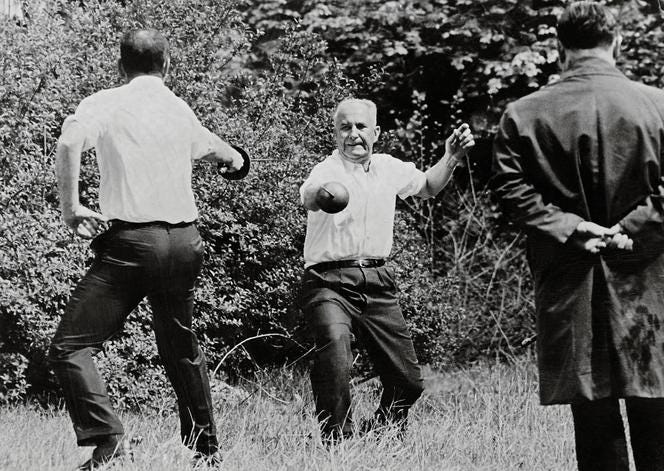On the Indictment of Honorary Barrister Régis de Castelnau
The shrill accusations of censorship by some independent media serve only to overshadow the true gravity of the issue at hand.
Though this story might appear trivial, it serves as a vivd example of how in France are exploited executive privileges to suppress dissenting voices.
The incessant outcries of censorship from some independent media grow wearisome. Far graver and more insidious is the sudden debanking of Télé Liberté1, a tactic—whether one values the outlet or not—that effectively stifles free expression. Those truly committed to pluralism should be troubled. Should the pendulum swing leftward next, the chorus of indignation will likely resound louder. In a society marred by double standards, some naively revel in others’ misfortunes, blind to the risk that the same arbitrary decision could one day befall them.
For nearly a decade, we have followed the work of Régis de Castelnau, a now retired barrister, whose incisive legal analyses of current affairs are consistently rooted in fact and serve as a public service in light of the widespread lack of legal literacy among French media. Eschewing the pleasantries of good society, he speaks with unapologetic candor, infusing his work with a truculence that compels to return for more.
Régis de Castelnau faces criminal indictment for defamation in a case brought by Charline Avenel, a National School of Administration2 schoolmate of Emmanuel Macron, who appointed her rector of the Versailles Academy3 by amending the eligibility criteria for the role. The controversy stems from 2023, when the rectorate she was leading issued a letter to parents grieving the suicide of their 15-year-old son, a victim of school bullying. The letter warned of legal repercussions should they persist in publicly criticizing the National Education system. De Castelnau condemned the letter as 'unacceptable,' asserting that it could amount to multiple criminal counts.
We refrain from speculating on a case unfamiliar to us, and even if we knew its details, our commentary would carry no weight, as we are not judges.
In a democracy, anyone who feels wronged may pursue civil litigation or file a criminal complaint, leaving it to the Sate to determine whether an investigation is warranted for a penal offense.
In the French legal framework of freedom of expression , a complaint filed with a civil party claim triggers an automatic indictment of the accused. Uniquely in this domain of criminal law, the trial itself serves as the investigation. Rather than a preliminary judicial inquiry, the process mandates an indictment and referral to a criminal court—a matter of procedural necessity.
The criminalization of defamation and insult under the 1881 French press freedom law was designed to abolish duels. In that era, disputes of honor were often resolved on the dueling field, with pistol or rapier in hand - for those who had some, on horseback, saber drawn.

The architects of the 1881 Press Freedom law, with insight and legislative precision, concluded that an insult such as 'go fuck youself and your mother, you cheeky bastard' concerns solely the offended party and the offender, sparing society any broader harm. Consequently, no judicial investigation is warranted. In most Western nations, defamation and insults are wisely relegated to civil courts.
Contrary to the clamor of the so-called 'reinfosphere,' Ms Avanel lawsuit is not censorship. True censorship entails pre-publication approval, modification, or prohibition of a work, or restricting its dissemination post-publication.
Ms. Avenel is within her rights to sue Régis de Castelnau for defamation. Yet, she does so not as a private citizen but as a public official, invoking the functional protection that allows public funds to cover her legal expenses.
This is a privilege -didn’t we French had a revolution to abolish them around 1789? It is reserved for public officials and elected representatives, who frequently exploit it for overtly political purposes. Oversight of such protections is nearly absent, leaving challengers to face protracted battles in administrative courts.
The real outrage lies in the systemic abuse of a privilege that enables the suppression of inconvenient truths, analyses, and opinions without consequence, as even a loss in court carries no personal cost. The burden falls squarely on French taxpayers. Since 2017, Macron’s outfit has honed its expertise in wielding lawsuits for trivial or strategic purposes, perfecting the use of circuitous legal tactics. Yet, the myriad corruption allegations against it seem perpetually stalled in some unreachable dimension.
Functional protection for public officials and elected representatives is not inherently flawed. The scandal arises from its exploitation in asymetric gag orders, SLAPs or intimidating lawsuits : one side enjoys cost-free litigation, while the other must shoulder legal expenses alone, even if vindicated.
Duels were waged on equal footing.
In France, the rule of law has never truly existed—only the law of the State prevails.
TVL, France’s oldest and most viewed conservative channel on the internet
France’s elite school of high-ranking civil servants, thus politicians
France’s largest school district






